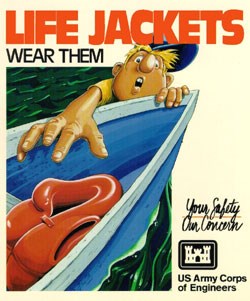NEWS RELEASE
U.S. COAST GUARD
********************* 2006 boating season begins: lake temps still frigid
CLEVELAND - Generally increased air temperatures around the lakes this week will mark the start of the Great Lakes boating season but lake waters remain quite cold.
The Coast Guard has already responded to several incidents on the Great Lakes this spring involving boaters unprepared for such challenges as rapidly changing weather or simply lacking essential equipment onboard their vessels.
Water temperatures in parts of the Great Lakes will hover in the mid- to upper 40s this week where survival time averages less than two hours.
Hypothermic shock and drowning are the leading causes of death in the spring boating months on the Great Lakes.
To reduce the chances of becoming just another boating statistic, the Coast Guard reminds boaters to plan ahead by following a few tips:
- wear the proper lifejacket or personal flotation device (PFD) for weather conditions. Most fatalities occur when hunters and fishermen fall overboard and do not have proper clothing or flotation
- check your equipment: fully-charged fire extinguishers, unexpired flares and working navigational lights are just some elements which may avert a disaster on the water
- don't drink and boat - alcohol reduces awareness levels and contributes to over half of boating accidents and several boating fatalities each year
- check weather forecasts before venturing out on the water. Promptly head to shore if the weather turns bad. Current forecasts are readily available on web pages and marine band broadcasts
- always have a marine band radio with a backup device such as a cell phone aboard. Cell phones can be handy but should not be the sole source of communication due to power and range. Marine band distress calls should be made on Channel 16 with hailing and non-distress calls on Channel 9
- file a float plan. The float plan should contain information about your departure, destination, duration of voyage and expected return. It should be given to friends or relatives in case of an emergency. The Coast Guard cannot take such information except under very extenuating circumstances
- apply for a courtesy marine exam (CME) - free of charge - by your local Coast Guard Auxiliary
- take a boating safety course - nearly ninety percent of all boating deaths involve an operator with no formal boating safety instruction. Call the Boating Safety Course Line: (800) 336-2628 or Boating Safety Hotline: (800) 368-5647 for a location nearest you
******************* Lest we forget
